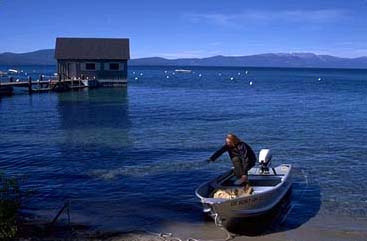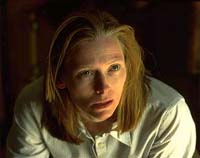 |


|
|
|
|
Film Review by John Demetry
Now, Tilda Swinton -- a creditable icon of contemporary Queer art -- finally graces the cover of that mainstay of gay conservatism for her role in The Deep End. Of course, Oscar buzz, art-house success, and critics' (i.e. the media's) up-turned thumbs follow in its contaminated wake. Not surprising, since The Deep End is the most insidiously homophobic movie to wash ashore since American Beauty. Once again, the gay and popular press encourage Queer audiences to drown themselves in self-hatred. And straight culture thrills to its own homophobic fantasies. Scott McGehee -- co-director and co-screenwriter of The Deep End with David Siegel -- is an out gay man. Being so hasn't stopped him and Siegel from cashing in on bourgeois prejudices and stereotypes -- as elemental to Hollywood movies as water is to the film's Lake Tahoe setting. McGehee and Siegel's detached style pretends to hit viewers like a cold splash of water, but really bathes them in warm comfort -- familiar film noir chic tailored to fit the snobs and hipsters. This film's "satire" of the middleclass is just another well-worn fashion plate. The pretty scenery has all the expressiveness of a real estate ad. The images have no meaning beyond their marketability. Endless images of Swinton's face reflected in mirrors and windows only seem to suggest something really deep. Swinton's blank reflection becomes the audience's own lack of self-reflection.
Swinton discovers that her teenaged son -- Jonathan Tucker -- has had an affair with a slimy older circuit fag played by Josh Lucas. Lucas plays the role with a sleazy mustache and a sleazier manner of speech. He ends every sentence with a smarmy appellative (a term of endearment) like: "lover." Such cliches signal that Lucas is a BAD guy. Who could believe that Tucker would involve himself with someone so obviously creepy as Lucas? Sex is powerful, but this movie never dramatizes this through Tucker's characterization. He spends the entire movie fighting back tears, not a hard-on. The movie depends on the presumption that gay men will let themselves get fucked by anyone. Making Lucas such an odious villain frees the audience and Swinton from any moral dilemma. He deserves to die. She must hide her son's gay life -- submerge it in the deep end of her middleclass existence -- and secure his middleclass future. The filmmakers, themselves, secure those values by using homophobia to confirm their cliched view of evil. Danger comes from outside the middleclass world, which means outside of the world of the movie's intended audience. Enter the blackmailers (not to be confused with swindlers McGehee and Siegel). They're homos, too. Sort of. The cute one, played by Goran Visnjic, ends up falling in love with Swinton. Her comfortable family life and her will to protect her gay son seem so much more attractive than his partner in crime, who is also (presumably) his lover. Visnjic is with him because he has a gambling addiction -- gays being so weak that they act out their oppression through degenerate, self-destructive behavior and oppressive personal relationships. Essentially, Visnjic falls for Swinton because she's straight -- because she's not gay.

The movie gives Swinton -- and the audience -- the chance to dive into the deep end of gay depravity. Even if the movie "reveals" that middleclass straights are also capable of such corruption, it defines this corrupting force as essentially Queer. Swinton watches a videotape of her son getting fucked by Lucas. The scene means to titillate while appeasing audience prejudice. The gay and straight press has made pointless -- homophobic! -- certainty that people know that Tucker called his girlfriend constantly during the scene's shoot. Exploiting both hetero curiosity and privilege and homo porno fantasies, the media also highlight that Tucker just turned 18 when the scene was shot. Such coverage falls in line with the filmmakers' diabolical design. "Like movies?" asks Visnjic of a horrified Swinton. The Deep End defines Queers to audiences as "others" -- as objects for voyeurism. In movie terms, and specifically in terms of the genre this film never transcends, "other" equates with "monster." At the end, Swinton says to her son: "I don't know what to say." Still, she manages to muster: "I love you." She loves her son DESPITE the fact that he's gay. McGehee and Siegel necessarily define that "despite" as what she doesn't know to say. The Deep End sentimentalizes audience homophobia as the axiom to its narrative logic -- and to its presumed movie pleasures. Clearly, McGehee and Siegel do not "like movies." They sell homophobia and hate - rather than love - as fun. In these PC times, that's the real "celluloid closet." It's time to "out" the homophobes. The deepest and most beautiful art liberates everyone from the closet. The Deep End is shallow. And it will not be the end. |

© 1997-2002 BEI
 Watching The Deep End, I remembered an ex-boyfriend's reaction to
American Beauty: "It made me hate myself for being gay." Such an atrocity
won awards, money, critical acclaim, and liberal middleclass acceptance.
Even the Advocate advocated it.
Watching The Deep End, I remembered an ex-boyfriend's reaction to
American Beauty: "It made me hate myself for being gay." Such an atrocity
won awards, money, critical acclaim, and liberal middleclass acceptance.
Even the Advocate advocated it.